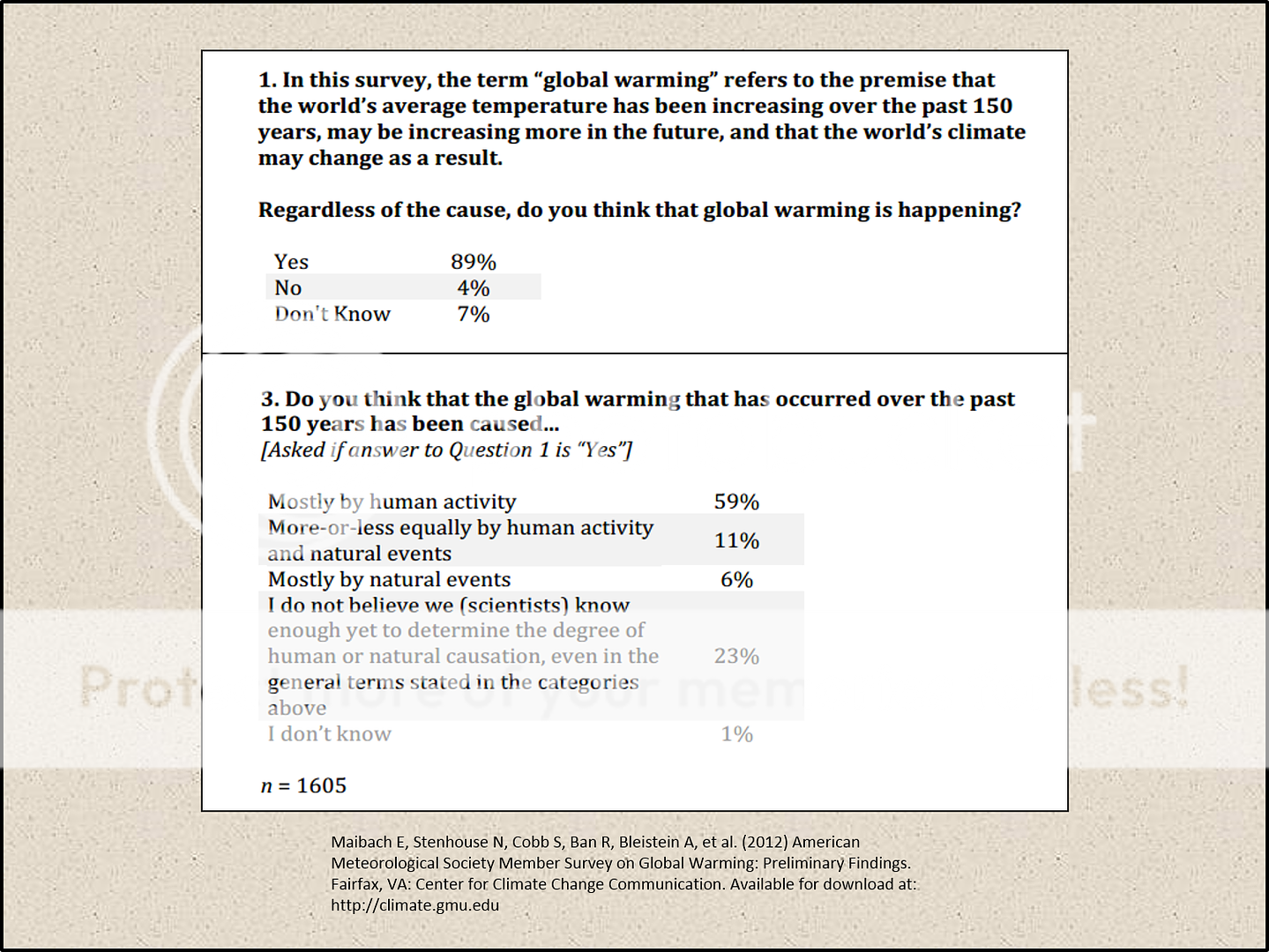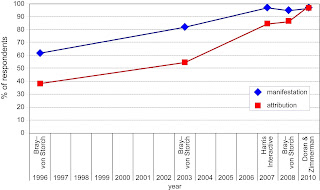- Joined
- Jan 28, 2013
- Messages
- 94,823
- Reaction score
- 28,342
- Location
- Williamsburg, Virginia
- Gender
- Male
- Political Leaning
- Independent
The Trump reference in the link is a bit misleading because the text isn't about Trump at all. It's about deconstructing the bogus "97% consensus" claim made by AGW advocates. That mission is thoroughly accomplished.
 Consensus
Consensus
President “Trump thinks scientists are split on climate change”… He’s right, Dana Nuccitelli is wrong
Guest rebuttal by David Middleton Trump thinks scientists are split on climate change. So do most Americans There’s a 97% expert consensus on human-caused global warming, but most Americans are unaware Dana Nuccitelli Mon 22 Oct 2018 06.00 EDT […] The Guardian Back around 2009, I “crossed swords” with Mr. Nuccitelli a few times in…
Stenhouse et al., 2014 told us that atmospheric scientists are very divided on climate change over the past 150 years.
[h=3]Meteorologists' Views About Global Warming: A Survey of American ...[/h]
[url]https://journals.ametsoc.org/doi/10.1175/BAMS-D-13-00091.1
[/URL]
by N Stenhouse - 2014 - Cited by 24 - Related articles
Published Online: 22 August 2014 ... To support this committee, in January 2012 we surveyed all AMS members with known e-mail addresses, ... CORRESPONDING AUTHOR: Neil Stenhouse, George Mason University, 4400 ... Businger et al.

89% × 59% = 52%… A far cry from the oft claimed 97% consensus. . . .
Stenhouse et al., 2017 tells us that there is conflict within the American Meteorological Society on the subject of climate change.
 Consensus
ConsensusPresident “Trump thinks scientists are split on climate change”… He’s right, Dana Nuccitelli is wrong
Guest rebuttal by David Middleton Trump thinks scientists are split on climate change. So do most Americans There’s a 97% expert consensus on human-caused global warming, but most Americans are unaware Dana Nuccitelli Mon 22 Oct 2018 06.00 EDT […] The Guardian Back around 2009, I “crossed swords” with Mr. Nuccitelli a few times in…
Stenhouse et al., 2014 told us that atmospheric scientists are very divided on climate change over the past 150 years.
[h=3]Meteorologists' Views About Global Warming: A Survey of American ...[/h]
[url]https://journals.ametsoc.org/doi/10.1175/BAMS-D-13-00091.1
[/URL]
by N Stenhouse - 2014 - Cited by 24 - Related articles
Published Online: 22 August 2014 ... To support this committee, in January 2012 we surveyed all AMS members with known e-mail addresses, ... CORRESPONDING AUTHOR: Neil Stenhouse, George Mason University, 4400 ... Businger et al.

89% × 59% = 52%… A far cry from the oft claimed 97% consensus. . . .
Stenhouse et al., 2017 tells us that there is conflict within the American Meteorological Society on the subject of climate change.
This article analyzes open-ended survey responses to understand how members of the American Meteorological Society (AMS) perceive conflict within the AMS over global warming. Of all survey respondents, 53% agreed that there was conflict within the AMS; of these individuals who perceived conflict, 62% saw it as having at least some productive aspects, and 53% saw at least some unproductive aspects. Among members who saw a productive side to the conflict, most agreed as to why it was productive: debate and diverse perspectives enhance science. However, among members who saw an unproductive side, there was considerable disagreement as to why. Members who are convinced of largely human-caused climate change expressed that debate over global warming sends an unclear message to the public. Conversely, members who are unconvinced of human-caused climate change often felt that their peers were closed-minded and suppressing unpopular views. These two groups converged, however, on one point: politics was seen as an overwhelmingly negative influence on the debate. This suggests that scientific organizations faced with similar conflict should understand that there may be a contradiction between legitimizing all members’ views and sending a clear message to the public about the weight of the evidence. The findings also reinforce the conclusion that attempts by scientific societies to directly address differences in political views may be met with strong resistance by many scientists. . . .


